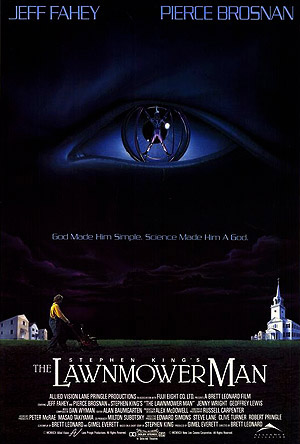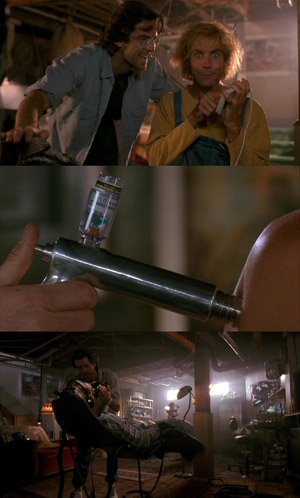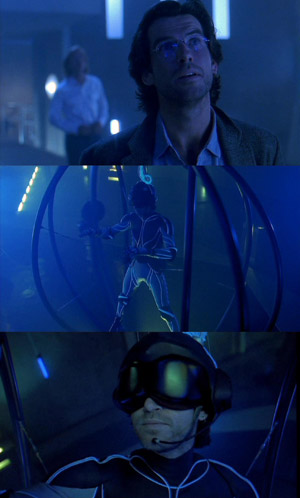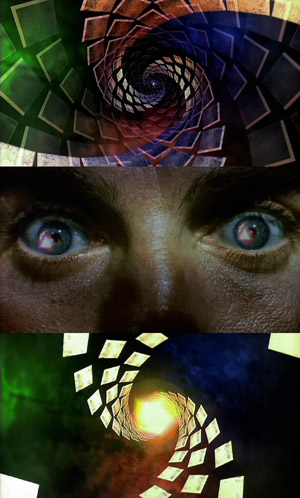
The Lawnmower Man
New Line Cinema
Original release: March 6, 1992
Running time: 108 minutes
Director: Brett Leonard
Writers: Brett Leonard, Gimel Everett
Cast: Jeff Fahey, Pierce Brosnan
Mind over matter: 00:53:51 to 00:56:19
Deconstructing Cinema: One Scene At A Time, the complete series so far
We live in a virtual reality. We work, shop, play, read, write and communicate in it. We share our experiences through a series of networks, servers and connections with strangers across the globe. We call it being “online” and it’s all about information; how we create, access and share it.
As we plug in and turn on, this virtual world becomes an extension of the one our lives began in, but soon we won’t be able to differentiate between them anymore. The lines are blurring to an extent it feels as if we’re only alive to feed this simulation, this “matrix”.
The Lawnmower Man was one of the earliest films to demonstrate this idea of becoming submerged in a virtual reality that changes us as human beings. Up until that point, we’d never heard of VR. It was something we believed to be in the realm of science fiction. Little did we know where we’d be in just 20 years.

At the start of the film we go into Virtual Space Industries, a company that’s conducting experiments on chimpanzees using drugs and virtual reality. They hope to increase the animals’ intelligence and if it works, they will apply the technology to build better soldiers and more effective weapons.
Dr. Lawrence Angelo (Pierce Brosnan), an employee at VSI, would much rather his research be used for non-military purposes. When he comes into contact with Jobe Smith (Jeff Fahey), a slow but well-meaning gardener, he secretly begins experimenting on him to increase Jobe’s brain power.
As the man’s brain begins to respond to the nootropic and virtual stimulation more rapidly than Dr. Angelo’s animal test subjects ever did, his personality changes as well. He starts to dress differently, he speaks more eloquently, women take notice of him and his ideas start to develop, too. Jobe also realizes he doesn’t have to take the bullying by the locals and the abuse by Father McKeen (Jeremy Slate).
The next step is for Dr. Angelo to take him to Virtual Space Industries. Wearing a bodysuit, gloves and a head-mounted display (HMD), Jobe is strapped into a huge gyroscope for a brain stem injection. It’s here we really get a look at what Dr. Angelo’s created. Up until now we’ve only seen the simulations he’s created at home with basic programs that allow him to fall, fly and float.

I think I’ve discovered a new planet… but one I’m inventing instead of discovering.
With these scenes, The Lawnmower Man became the first feature film in the 1990’s to use computer animation to explore virtual reality. A spectrum of smoky colours take us in, and swirling shapes spiral downwards into infinity, pulsating and then exploding into blinding white light. Geometric patterns shoot forward, dazzling Jobe as he moans. While Dr. Angelo prepares the injection, his boss, Sebastian Timms (Mark Bringleson), looks on from an observation deck.
We see an image of Jobe’s brain igniting as his synaptic activity increases. Timms looks pleased as he walks away; knowing it will be a success and the military will be able to develop a new line of defence.
But it’s not just Jobe’s cognitive functions that improve. Unexpectedly, he also develops psychic and telekinetic capabilities, and in the following scene he discusses this with Dr. Angelo — the most interesting part of the story.
Dr. Angelo walks into his laboratory to find Jobe standing in the middle of the room, starring up at the gyroscope.
I thought you were doing lawns today.
JOBE:
I wish I were.

Jobe takes a chair and places it in front of him. Dr. Angelo looks on in disbelief as he begins to float it. Timms also sees it from the observation deck, his mouth is wide open in disbelief — probably adding up the billions of dollars in contracts VSI will be able to secure with the military.
Mind over matter, Dr. Angelo. Not a miracle. A fact.
DR. ANGELO:
I have to run some tests. Get a clearer picture. This is all so new.
JOBE:
It’s not new. I realize that nothing we’ve been doing is new. We haven’t been tapping into new areas of the brain. We’ve just been awakening the most ancient. This technology is simply a route to powers… that conjurers and alchemists used centuries ago. The human race lost that knowledge… and now I’m reclaiming it through virtual reality.
Dr. Angelo steps back and listens, almost in horror, as Jobe speaks. It’s only starting to sink in what he’s done to him.
You’re moving too fast. Even with all these new abilities, there are dangers. Man may evolve a thousandfold through this technology… but the rush must be tempered with wisdom. No! No! You’re trying to get inside my head, Jobe. I can feel you pushing.
JOBE:
You realize, Dr. Angelo… that my intelligence has surpassed yours… and I can’t allow your fear of what you don’t understand… to get in the way of this work. The treatments have to continue. We have no choice.

This is when Dr. Angelo realises that Jobe will stop at nothing to access that knowledge through virtual reality and become smarter and stronger.
Have we become Jobe? Is the technology a route to powers that have lain dormant in us? Are we tapping into something or is it tapping into us, using us to advance its own agenda?
Essentially, virtual reality is about the navigation and manipulation of 3D computer-generated environments. A VR user is able to navigate by walking, running or even flying through a virtual environment and explore viewpoints that would be impossible in the real world. But the real benefit of VR is the ability to touch, animate, pickup and reposition virtual objects and create totally new configurations.” ¹
Twitter, Facebook, Youtube, Second Life, WII and Xbox all expose us to virtual environments, perhaps not in the way as depicted in The Lawnmower Man – we don’t wear helmets, gloves or spin around in a gyroscope – but we might as well.
What we experience in these environments is so far removed from the “real world” that over time it begins to numb us. A handshake, hug, a kiss or a simple “excuse me” when someone is in your way is replaced by likes, pokes, 140 characters, picture sharing, Farmville, virtual battlefields and stages where we’re guitar heroes, celebrities, porn stars and bodybuilders doing power workouts.

As a result, our attentions are focused on these boxes and interaction with the real world begins to pale in comparison. Indifference becomes easier; in the face of injustice and intolerance we can turn the other cheek because if it’s happening to someone else it doesn’t directly affect us, not as it would in our virtual reality. That’s where our emotions and thoughts are diverted to. It’s not bringing us closer together.
We expect access to everything NOW, instantly and simultaneously. We suffer from a logic of total management in which everything must be at our disposal. Eventually out madness will cost us. There is a law of diminishing returns: the more information accessed, the less significance is possible.” ²
Has this alternate reality, the one which we’ve migrated to, become a form of mind control, a place where we’re obedient consumers and ready-to-fight soldiers?
- Vince, J. A. (2004) Introduction to Virtual Reality, Springer ¹
- Heim, M. (1994) The Metaphysics of Virtual Reality, OUP ²
We have less and less control over our actions, thoughts and emotions while “plugged in”. The more we access, the less there is, and as a result, we’ll be no better off than Jobe. While we constantly worry about the threat of viruses and busy ourselves with protection, we neglect to realise in the process, like Jobe, we’ve become the virus and it might be time to unplug.

Patrick Samuel
The founder of Static Mass Emporium and one of its Editors in Chief is an emerging artist with a philosophy degree, working primarily with pastels and graphite pencils, but he also enjoys experimenting with water colours, acrylics, glass and oil paints.
Being on the autistic spectrum with Asperger’s Syndrome, he is stimulated by bold, contrasting colours, intricate details, multiple textures, and varying shades of light and dark. Patrick's work extends to sound and video, and when not drawing or painting, he can be found working on projects he shares online with his followers.
Patrick returned to drawing and painting after a prolonged break in December 2016 as part of his daily art therapy, and is now making the transition to being a full-time artist. As a spokesperson for autism awareness, he also gives talks and presentations on the benefits of creative therapy.
Static Mass is where he lives his passion for film and writing about it. A fan of film classics, documentaries and science fiction, Patrick prefers films with an impeccable way of storytelling that reflect on the human condition.
© 2022 STATIC MASS EMPORIUM . All Rights Reserved. Powered by METATEMPUS | creative.timeless.personal. | DISCLAIMER, TERMS & CONDITIONS
HOME | ABOUT | CONTACT | TWITTER | GOOGLE+ | FACEBOOK | TUMBLR | YOUTUBE | RSS FEED
CINEMA REVIEWS | BLU-RAY & DVD | THE EMPORIUM | DOCUMENTARIES | WORLD CINEMA | CULT MOVIES | INDIAN CINEMA | EARLY CINEMA
MOVIE CLASSICS | DECONSTRUCTING CINEMA | SOUNDTRACKS | INTERVIEWS | THE DIRECTOR’S CHAIR | JAPANESE CINEMA





